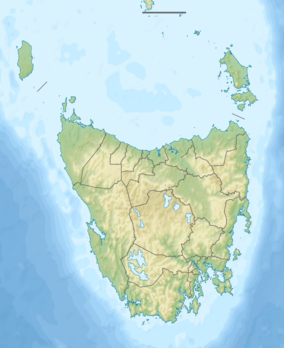| Miena Rockfill Dam | |
|---|---|
 Location of the Miena Rockfill Dam in Tasmania | |
| Country | Australia |
| Location | Central Highlands Tasmania |
| Coordinates | 41°58′48″S 146°43′48″E / 41.98000°S 146.73000°E |
| Purpose | Power |
| Status | Operational |
| Opening date | 1967 |
| Owner(s) | Hydro Tasmania |
| Dam and spillways | |
| Type of dam | Embankment dam |
| Impounds | Shannon River |
| Height | 28 metres (92 ft) |
| Length | 1,136 metres (3,727 ft) |
| Dam volume | 481 thousand cubic metres (17.0×106 cu ft) |
| Spillways | 1 |
| Spillway type | Controlled |
| Spillway capacity | 58 cubic metres per second (2,000 cu ft/s) |
| Reservoir | |
| Creates | Great Lake |
| Total capacity | 3,156,640 megalitres (111,476×106 cu ft) |
| Catchment area | 399 square kilometres (154 sq mi) |
| Surface area | 1,761.2 hectares (4,352 acres) |
| Poatina Power Station | |
| Coordinates | 41°48′42″S 146°55′08″E / 41.81167°S 146.91889°E |
| Operator(s) | Hydro Tasmania |
| Commission date | 1966; 1977; 2008; 2010 |
| Type | Conventional |
| Hydraulic head | 758 metres (2,487 ft) |
| Turbines |
|
| Installed capacity | 313 megawatts (420,000 hp) |
| Capacity factor | 0.8 |
| Annual generation | 1,255 gigawatt-hours (4,520 TJ) |
| Website www | |
| [1] | |
The Poatina Power Station is a conventional hydroelectric power station located in the Central Highlands region of Tasmania, Australia. The power station is situated on the Great Lake and South Esk and is owned and operated by Hydro Tasmania.
Technical details
Located in the Great Lake and South Esk catchment area, Poatina makes use of a 900-metre (3,000 ft) descent from the Great Western Tiers to the Norfolk Plains in Tasmania's northern Midlands.[2][3] Water from Great Lake is diverted via a tunnel to the edge of the Great Western Tiers where it plummets down a viable penstock line, which enters the ground again near the power station. The Poatina Power Station is located 150 metres (490 ft) underground in a massive artificial cavern hence the name Poatina, Palawa for "cavern" or "cave". The headrace tunnel and penstocks were bored through mudstone with the aid of a Robbins Mole. Water leaves the power station via a roughly 4-kilometre (2.5 mi) long tailrace tunnel and discharges into the Macquarie River via Brumbies Rivulet.[4]
Poatina was commissioned in 1964, and replaced the Waddamana and Shannon power stations. The small construction village of Poatina sits perched on top of a low plateau, 3.5 kilometres (2.2 mi) from the stations subterranean location.[4]
The power station has six vertical shaft generating sets, five Boving 51.6-megawatt (69,200 hp) Pelton-type turbines of which three are upgraded Andritz turbines and one Fuji 54.5-megawatt (73,100 hp) Pelton-type turbine with a combined generating capacity of 300 megawatts (400,000 hp) of electricity. The station output, estimated at 1,255 gigawatt-hours (4,520 TJ) annually,[1] is fed to TasNetworks' transmission grid via underground circuit breakers to two 16 kV/110 kV and four 16 kV/220 kV generator transformers located in the switchyard above.[4]
2016 Tasmanian energy crisis
The Poatina output in early 2016 had dropped to one-fifth of capacity due to ongoing water shortage in Tasmania's hydro system.[5]
See also
References
- 1 2 "Register of Large Dams in Australia". Dams information. Australian National Committee on Large Dams. 2010. Archived from the original (Excel (requires download)) on 12 December 2013. Retrieved 23 June 2015.
- ↑ "yingina / Great Lake". Hydro Tasmania. Retrieved 24 June 2023.
- ↑ Bowling, Tom; Hughes, Roger (December 2004). "Tunnel Repairs in the Poatina Hydro-electric Scheme, Tasmania" (PDF). Australian Geomechanics. 39 (4): 55–62. Retrieved 14 March 2018.
- 1 2 3 "Poatina Power Station: yingina / Great Lake – South Esk Catchment" (PDF). Hydro Tasmania. Archived (PDF) from the original on 24 September 2015. Retrieved 24 June 2023.
- ↑ "Hydro Tasmania staff preparing for 24-hour blackouts: Union". ABC News. 22 March 2016.